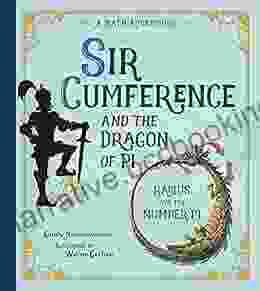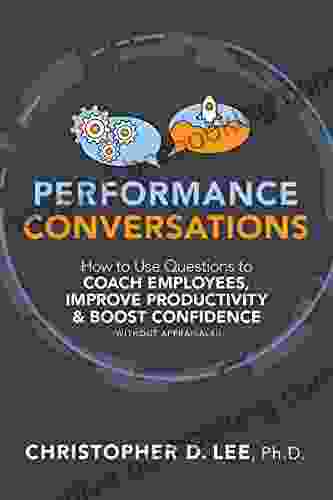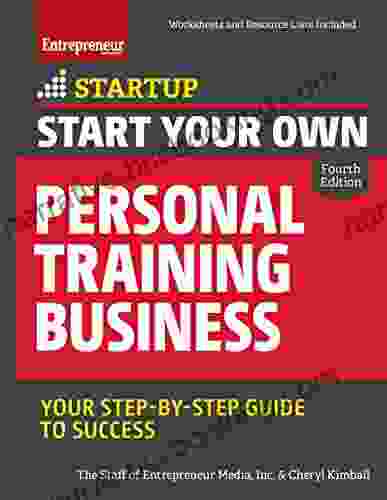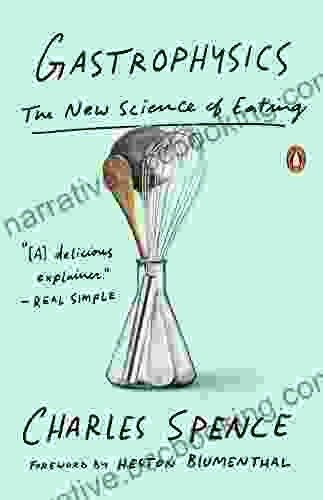How to Use Questions to Coach Employees to Improve Productivity and Boost Success

In today's rapidly evolving business landscape, it's more important than ever for organizations to have a highly engaged and productive workforce. Coaching plays a crucial role in unlocking employee potential and driving organizational success. One of the most powerful tools in a coach's arsenal is the use of questions.
4.7 out of 5
| Language | : | English |
| File size | : | 2381 KB |
| Text-to-Speech | : | Enabled |
| Screen Reader | : | Supported |
| Enhanced typesetting | : | Enabled |
| X-Ray | : | Enabled |
| Word Wise | : | Enabled |
| Print length | : | 228 pages |
| Lending | : | Enabled |
When used effectively, questions can:
- Empower employees to take ownership of their development
- Enhance critical thinking and problem-solving skills
- Foster a culture of continuous learning and improvement
- Identify areas for growth and provide targeted support
- Build trust and strengthen relationships between coaches and employees
While asking questions may seem like a simple task, it's an art that requires practice and refinement. In this comprehensive guide, we'll delve into the power of using questions as a coaching tool and provide you with practical strategies and examples to help you master this essential skill.
Types of Coaching Questions
There are various types of coaching questions that can be used to achieve different objectives. Here are some of the most commonly used:
- Open-ended questions: These questions encourage employees to elaborate and provide detailed responses. They begin with words like "what," "how," "why," and "tell me about."
- Example: "What are your thoughts on the current project?"
- Closed-ended questions: These questions elicit specific, factual answers. They often begin with words like "is," "are," "did," and "can."
- Example: "Did you complete the report on time?"
- Reflective questions: These questions help employees reflect on their experiences and insights. They often begin with phrases like "what did you learn" or "how did that make you feel."
- Example: "What did you learn from that presentation?"
- Probing questions: These questions encourage employees to delve deeper into their thoughts and feelings. They often use phrases like "tell me more" or "can you elaborate."
- Example: "Can you tell me more about why you think that?"
- Challenging questions: These questions encourage employees to rethink their assumptions and consider alternative perspectives. They often begin with words like "what if" or "why not."
- Example: "What if you approached the problem from a different angle?"
By skillfully combining different types of questions, coaches can create a powerful dialogue that fosters growth and development.
Effective Questioning Techniques
In addition to choosing the right type of questions, there are several effective questioning techniques that coaches can employ:
- Active listening: Pay full attention to the employee's responses, both verbal and nonverbal. Ask clarifying questions to ensure understanding.
- Paraphrasing: Restate the employee's responses in your own words to show that you're listening and to encourage further elaboration.
- Summarizing: Provide a brief overview of the key points discussed during the session to help the employee synthesize their thoughts and identify areas for action.
- Delaying judgment: Avoid interrupting or offering your own opinions until the employee has fully expressed themselves.
- Asking follow-up questions: Probe deeper into the employee's thoughts and feelings to gain a more comprehensive understanding of their perspective.
By practicing these techniques, coaches can create a safe and supportive environment where employees feel comfortable sharing their thoughts and ideas.
Examples of Coaching Questions
To illustrate the power of coaching questions, here are a few examples that you can use in your own practice:
- To enhance self-awareness
- "What are your strengths and weaknesses?"
- "What motivates you at work?"
- "What are your career aspirations?"
- To improve performance
- "What can you do differently to achieve better results?"
- "How can I support your development in this area?"
- "What resources or training would be helpful for you?"
- To solve problems
- "What is the root cause of this problem?"
- "What alternative solutions can we explore?"
- "What are the potential risks and benefits of each option?"
- To foster growth and development
- "What do you want to achieve in the next year?"
- "What challenges are you currently facing in your role?"
- "How can we create a plan to address these challenges?"
- To build trust and rapport
- "How can I best support you as your coach?"
- "What do you appreciate about our coaching sessions?"
- "How can we make this partnership even more effective?"
These are just a few examples of the countless questions that you can use in your coaching practice. By tailoring your questions to the specific needs of your employees, you can empower them to unlock their full potential and achieve their goals.
Benefits of Using Questions in Coaching
The benefits of using questions in coaching are numerous and far-reaching:
- Promotes employee engagement and ownership: By asking questions, coaches involve employees in their own development and empower them to take responsibility for their growth.
- Enhances critical thinking and problem-solving skills: Thought-provoking questions encourage employees to analyze situations, consider multiple perspectives, and develop creative solutions.
- Fosters a culture of continuous learning and improvement: Asking questions creates a space where employees feel supported and encouraged to seek feedback and identify areas for growth.
- Improves communication and collaboration: Effective questioning facilitates open and honest communication between coaches and employees, fostering trust and understanding.
- Boosts productivity and success: By using questions to identify challenges, set goals, and develop action plans, coaches empower employees to improve their performance and achieve desired outcomes.
When used strategically, questions become a powerful tool for unlocking the potential of employees and driving organizational success.
Mastering the art of using questions in coaching is a transformative skill that can empower employees, enhance productivity, and drive organizational success. By choosing the right type of questions, employing effective questioning techniques, and tailoring your questions to the specific needs of your employees, you can unlock their full potential and create a high-performing team.
Remember, coaching is a journey, not a destination. By continuously refining your questioning skills, you can become a more effective coach and make a lasting impact on the lives of your employees.
4.7 out of 5
| Language | : | English |
| File size | : | 2381 KB |
| Text-to-Speech | : | Enabled |
| Screen Reader | : | Supported |
| Enhanced typesetting | : | Enabled |
| X-Ray | : | Enabled |
| Word Wise | : | Enabled |
| Print length | : | 228 pages |
| Lending | : | Enabled |
Do you want to contribute by writing guest posts on this blog?
Please contact us and send us a resume of previous articles that you have written.
 Book
Book Novel
Novel Page
Page Chapter
Chapter Text
Text Story
Story Genre
Genre Reader
Reader Library
Library Paperback
Paperback E-book
E-book Magazine
Magazine Newspaper
Newspaper Paragraph
Paragraph Sentence
Sentence Bookmark
Bookmark Shelf
Shelf Glossary
Glossary Bibliography
Bibliography Foreword
Foreword Preface
Preface Synopsis
Synopsis Annotation
Annotation Footnote
Footnote Manuscript
Manuscript Scroll
Scroll Codex
Codex Tome
Tome Bestseller
Bestseller Classics
Classics Library card
Library card Narrative
Narrative Biography
Biography Autobiography
Autobiography Memoir
Memoir Reference
Reference Encyclopedia
Encyclopedia Charles W Dunn
Charles W Dunn Christian Cornia
Christian Cornia Cheryl Marlene
Cheryl Marlene Charles Spender
Charles Spender Charles Oliver
Charles Oliver Charles Sumner
Charles Sumner Charles Timoney
Charles Timoney Chris Belchamber
Chris Belchamber Charmian Mead
Charmian Mead Christopher Many
Christopher Many Chuy Renteria
Chuy Renteria Chris Matthews
Chris Matthews Chana Stiefel
Chana Stiefel Cathy Haase
Cathy Haase Cillyart Cindy M Bowles
Cillyart Cindy M Bowles Christopher E Mason
Christopher E Mason Cay S Horstmann
Cay S Horstmann Channing Gardner
Channing Gardner Chris Cocks
Chris Cocks Chris Sarra
Chris Sarra
Light bulbAdvertise smarter! Our strategic ad space ensures maximum exposure. Reserve your spot today!

 Ezekiel CoxBeing His Own Log Letters And Dispatches With Connecting Narratives Classics...
Ezekiel CoxBeing His Own Log Letters And Dispatches With Connecting Narratives Classics... Darnell MitchellFollow ·7k
Darnell MitchellFollow ·7k Max TurnerFollow ·5.6k
Max TurnerFollow ·5.6k Rodney ParkerFollow ·12.3k
Rodney ParkerFollow ·12.3k Ernest PowellFollow ·2.1k
Ernest PowellFollow ·2.1k Blake KennedyFollow ·10.3k
Blake KennedyFollow ·10.3k Samuel BeckettFollow ·16.6k
Samuel BeckettFollow ·16.6k Quincy WardFollow ·13.3k
Quincy WardFollow ·13.3k Chuck MitchellFollow ·16.6k
Chuck MitchellFollow ·16.6k

 J.R.R. Tolkien
J.R.R. TolkienEscape to the Culinary Paradise: "Truck Stop Deluxe In...
Prepare your palate for an...

 Andres Carter
Andres CarterA Taste of the Unusual: Discover the Enchanting World of...
Prepare to be captivated by "Cindy Supper...

 Nick Turner
Nick TurnerChild Obesity: Introducing the Idea of Healthy Weight
Child obesity is a serious...

 Junot Díaz
Junot DíazGoing Local: Your Ultimate Guide to Swiss Schooling |...
In the heart of Europe, Switzerland boasts a...

 Raymond Parker
Raymond ParkerSir Cumference and the Dragon of Pi: A Mathematical Fable
In the enchanting realm of...

 Thomas Powell
Thomas PowellUnveiling the Enchanting Realm of Curious Creatures from...
Russian folklore is a rich tapestry of...
4.7 out of 5
| Language | : | English |
| File size | : | 2381 KB |
| Text-to-Speech | : | Enabled |
| Screen Reader | : | Supported |
| Enhanced typesetting | : | Enabled |
| X-Ray | : | Enabled |
| Word Wise | : | Enabled |
| Print length | : | 228 pages |
| Lending | : | Enabled |










